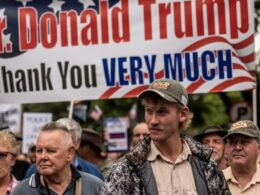Unlock the Editor’s Digest for free
Roula Khalaf, Editor of the FT, selects her favourite stories in this weekly newsletter.
New US college graduates are struggling to find jobs as businesses reduce hiring plans because of economic uncertainty, in what economists warned could be an early sign of trouble for the broader labour market.
Job postings on student and graduate recruitment platform Handshake were down 15 per cent between July 2024 and mid-April 2025, compared with the same period in the previous academic year.
Internships, a common entry point to the workforce for recent graduates, were also advertised on employment website Indeed at the slowest pace since the height of the Covid-19 pandemic, according to figures shared with the Financial Times.
The slowdown in graduate recruitment could be an early sign of trouble for the broader labour market, warned James Knightley, chief international economist at ING.
“The first thing to go is the entry-level hiring,” he said.
The economic uncertainty and stock market jitters triggered by President Donald Trump’s sweeping trade levies on some of the US’s most important trading partners have slowed many companies’ hiring plans — exacerbating an already cool job market for entry-level candidates.
Employers polled by the National Association of Colleges and Employers last August and September predicted that they would hire 7.3 per cent more graduates this year than in 2024. By this March, however, the estimate was slashed to just 0.6 per cent.
Consulting giant EY delayed start dates for new graduates hired by its US strategy and deal advisory business because of “uncertain and evolving market conditions”.
Unemployment among college graduates aged 22 to 27 climbed to 5.8 per cent in March, from 4.8 per cent in January, according the Federal Reserve Bank of New York’s analysis of the Current Population Survey. The overall US unemployment rate held steady at 4 per cent.
Guy Berger, director of economic research at the non-profit Burning Glass Institute, said the labour market was “freezing” as businesses simultaneously made fewer hires and fewer job cuts, making it harder for early-career workers to break into the labour force.
“People that already have jobs are relatively insulated,” he said. “People looking for jobs are facing a much tougher environment.”
The monthly hiring rate — the number of new hires as a proportion of overall employment — was 3.4 per cent in the first three months of 2025, the slowest for that period in more than a decade, according to the Bureau of Labor Statistics.
The federal government hiring freeze implemented on Trump’s first day in office and extended until July has also blocked some popular career paths for graduating students. Moreover, many experienced federal workers axed by Elon Musk’s so-called Department of Government Efficiency are competing with new graduates for a shrinking pool of opportunities.
Students seeking to arrange jobs ahead of graduation were applying to more positions and experiencing lengthier recruitment processes as hiring managers were “extra cautious” compared with recent years, said Cindy Meis, director of undergraduate career services at the University of Iowa’s Tippie College of Business.
“If you’re trying to enter the labour market, then it’s a very frustrating time,” said Allison Shrivastava, an economist at the Indeed Hiring Lab.
Source link









